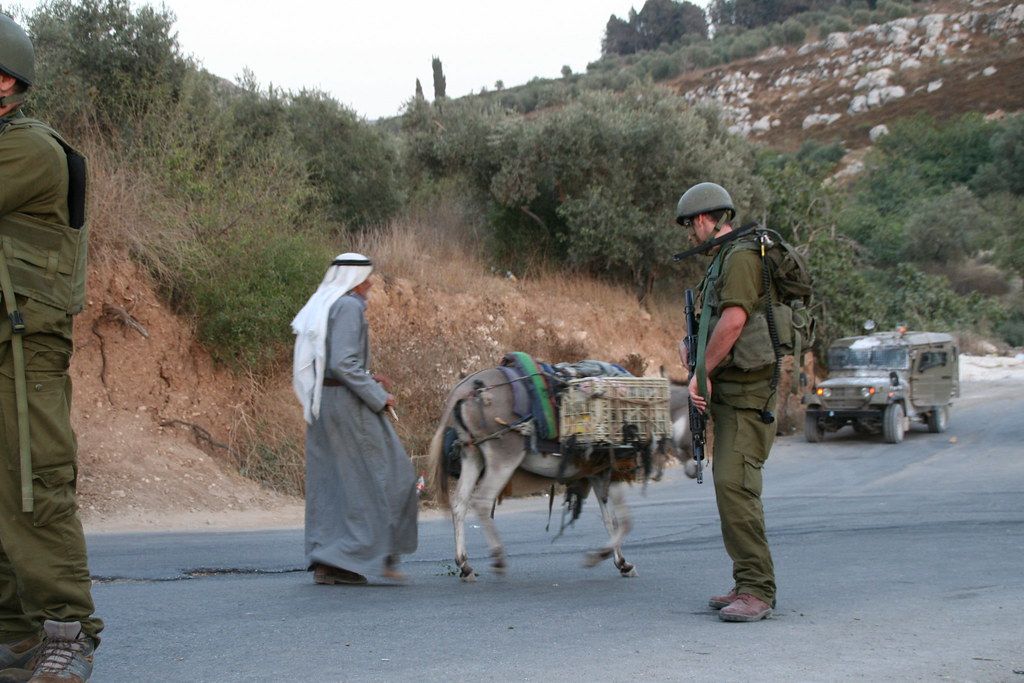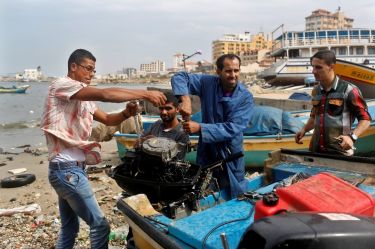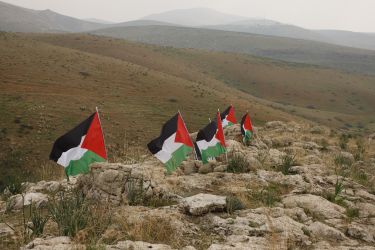
Consistent support for human rights includes Palestinian rights
Today, we are publishing a new briefing setting out evidence of the extent of oppression linked to the occupation - in Palestine. This builds on Justice for Palestine: promoting decent work and Palestinian rights, published by the TUC in 2020.
Read Justice for Palestine report 2020
Read Justice for Palestine briefing 2022
Life for a worker in Palestine today
After decades of illegal occupation, the situation faced by ordinary Palestinians continues to deteriorate. The violence of the occupation has intensified, resulting in ever increasing Israeli control of Palestinian workers, movement, and access to services.
Illegal seizures of Palestinian land by the Israeli state are also accelerating. This includes the demolition of Palestinian homes and the displacement of Palestinian people to make way for the expansion of an illegal settlement programme.
Because the West Bank is largely under military occupation and the economy of Gaza is effectively blockaded, Palestinian freedom to develop their natural resources is denied. As such, many Palestinians are forced to migrate daily or seasonally into Israel for work.
Around 80,000 Palestinian workers from the OPT work in Israel with permits. The 2021 ITUC report, Workers’ Rights in Crisis, documented the exploitation of Palestinian workers in the West Bank and Israel - finding evidence of very low wages, unsafe conditions, and alarming gaps in social protection.
At the checkpoints, where workers cross into Israel, it found that Palestinians are subjected to humiliating treatment and harassment, including an increased risk of sexual harassment for women.
Workers’ ability to defend themselves is further limited by restrictions on the activity of Palestinian trade unions to operate in territory controlled by Israel.
These are the economic conditions in which systematic racial discrimination takes place. They are conditions that mean an end to the conflict - and progress towards a viable two state solution – is further away than ever.
A sustainable peace, based on a functional Palestinian state with a functional economy, is being critically undermined by the social and economic costs of the occupation.
The framework of international law
The TUC believes that our language and understanding of the Palestinian situation should be rooted in international law and respect for human rights. The UK should accept the framework of international law equally and consistently around the world, not just when it is politically expedient to do so.
In the two years since the publication of our 2020 report, several credible and high-profile organisations have contributed to the evidence highlighting the harsh realities faced by ordinary Palestinians under occupation.
In relation to Palestine, the TUC General Council has noted that the crime of apartheid is increasingly discussed in respect of its definition under international law. A 2020 TUC motion considered the term apartheid, and significant human rights organisations, including B’Tselem and Human Rights Watch, now use the term.
Since we published this, other important human rights organisations like the United Nations and Amnesty International have also adopted the term. Palestinian human rights organisations like Al-Haq have used it for some time.
Violence and impunity
The occupation is maintained and enforced by violence.
In May 2021, shortly after the publication of our report, Gaza came under ariel bombardment by Israeli armed forces. The attack on Gaza was accompanied by an escalation of violence in East Jerusalem and the West Bank, linked the planned eviction of Palestinian families from their homes in Sheikh Jarrah.
In August 2022, Gaza came under bombardment again, with a death toll of 49 Palestinians including at least 17 children.
In May 2021 the International Criminal Court declared its intention to open an investigation into crimes committed on Palestinian territory since 2014. The Israeli government responded with a blanket refusal to cooperate.
In October that year, six Palestinian human rights organisations were unilaterally declared terrorist organisations by the Israeli government. In August 2022, their offices were raided by soldiers who, after confiscating various items, welded the office doors shut to prevent re-entry.
In May 2022 the journalist Shireen Abu Akleh was murdered in the West Bank. Israeli authorities immediately denied responsibility, blaming the Palestinians themselves. Shortly afterwards, a UN investigation refuted these claims, finding that the shots that killed Abu Akleh came from Israel Security Forces. The UN urged Israel to open a criminal investigation themselves, which they failed to do.
Using our influence on trade
UK trade is one possible lever to lift labour standards, provide good jobs, and reduce inequality around the world.
However, the UK government has rushed into talks with countries that readily abuse human rights and workers’ rights – with no questions asked – including India, Turkey, Brazil, and the Gulf States. Israel is another example to add to a growing list.
That’s why the TUC rejects a trade deal with Israel until fundamental rights are respected – just as we do with all these countries. The TUC responded to the UK government’s consultation on the proposed UK-Israel Free Trade Agreement by setting out the human and labour rights violations experienced by Palestinians due to the occupation.
We argued that the economy of Israel is inseparable from the illegal activity taking placing in the Occupied Palestinian Territories because Israel is in a customs union with the OPT. Therefore, UK government claims that trade with Israel can somehow exclude the Occupied Palestinian Territories, is misleading.
It’s also misleading because the UK’s weak, voluntary guidance on labelling means that settlement goods, tainted by exploitation of Palestinian labour, could be mislabelled as ‘Israeli’ and enter UK markets, benefitting from trade preferences. The TUC is calling for a ban on UK trade in settlement goods, supported by mandatory, robust and transparent labelling.
As our new briefing sets out, the violence of the occupation is intensifying - 2021 marked the 7-year high in the number of Palestinian deaths resulting from confrontations with Israelis related to the occupation. The UK continues to export arms to Israel, and British military hardware was used in the May 2021 bombardment of Gaza. TUC policy has long called for an end to the UK’s military collaboration with Israel.
So, instead of treating trade deals as publicity tools, and allowing Israel to flout international law and act with impunity, the UK government should be using its leverage on the global stage to promote human rights, decent work, and peace.
To help end Israel’s illegal occupation of Palestinian territory, and promote respect for Palestinian rights and decent work, the TUC is calling on the UK government to:
- recognise the State of Palestine
- ban the UK’s trade in goods with the illegal settlements, supported by mandatory, robust and transparent labelling
- not sign a trade deal with Israel, Brazil, the Gulf States, India and Turkey – which are systematically abusing human rights.
- end arms trading with Israel and military collaboration
- support a just, comprehensive and lasting peace that is consistent with international law and based on a two-state solution, which promotes equality and respect for human and labour rights.
Stay Updated
Want to hear about our latest news and blogs?
Sign up now to get it straight to your inbox



